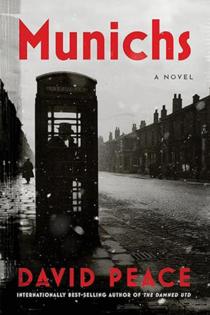Review: Manchester United soccer players were among the crash victims whose tale is told in novel 'Munichs'
Published in Books News
Munich is notorious as a backdrop for historical events — the ascent of the Third Reich, the slaughter of Israeli athletes during the 1972 Olympics — but a lesser-known tragedy dominates David Peace’s electrifying novel, “Munichs.”
It’s the crash of a chartered propeller plane on February 6, 1958, just after a blizzardy take-off, killing 23 of its 44 passengers and crew, including members of Manchester United’s famed soccer team. (After a Red Devils triumph in Belgrade, the flight had stopped to refuel at the Bavarian airport.)
“Munichs” conjures the visceral moments of the accident as well as the prolonged pain tossed like a shroud over both his characters and a nation, whose collective mourning raises more questions than it answers.
Peace’s prose grips us by our throats from the get-go. The opening sequence — survivors scrambling amid the wrecked fuselage, some uninjured, others with shattered bones and bruised organs — unfolds with the immediacy of a nightmare, or a German Expressionist film. Bill Foulkes and Harry Gregg emerge from a tangle of metal and flame unscathed while Bobby Charlton, one of the youngest “lads,” suffers a laceration to his skull.
Victims are laid out in a row and later transported to Britain in matching coffins. United’s hospitalized manager, Matt Busby, clings to consciousness in an oxygen tent. He’d built a legendary squad, supported by cheerful Jimmy Murphy (back at team headquarters, known as Old Trafford). These men live and breathe the sport, buoyed by their devotion to one another. Peace’s love of the game gleams in each chapter.
“Munichs” follows a tight chronology in the aftermath, flitting among its cast. As the news spreads that slushy evening, Peace brilliantly recreates the initial disbelief and flippant rationalizations of those affected. He deploys ellipses generously, highlighting his characters’ fractured souls, their trailing thoughts.
His long kinetic sentences loop and twirl on themselves; his dexterous use of rhythm and repetition propel his narrative. He even winks to his technique: as the United community gathers to travel across the Channel, “[T]he airlines were already talking about delays to the flights, the terrible weather en route, the danger, the risks that didn’t need to be said, of repetition, repetition.”
Local investigators hunt for a scapegoat. Jimmy escorts dazed Bill and Harry home, where they grapple with guilt and ennui. Bobby reunites with his mother, Cissie, who has been fielding phone calls and gaggles of journalists, basking in the publicity. He recoils: “No bloody wonder he hardly said a word, no bloody point round here, not when she always knew best, putting on her pinny, making sure she looked her best.”
Peace targets the banality of British institutions, among them the tabloid press and using the proverbial cup of tea as a salve to unspeakable trauma, a self-soothing ritual to a generation just a few years removed from World War II.
The novel echoes James Joyce’s “The Dead,” the threshold of mortality transfigured beneath a cloak of snow. Peace limns the nature of shared grief: widows weep and scream while the lucky ones rush to put a kettle on. Beautifully conceived and executed, “Munichs” plumbs the fraught legacy of loss. It’s a master stroke from a writer at the height of his powers.
____
Munichs
By: David Peace.
Publisher: Norton, 480 pages, $29.99.
©2024 The Minnesota Star Tribune. Visit at startribune.com. Distributed by Tribune Content Agency, LLC.













Comments